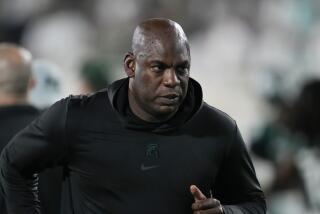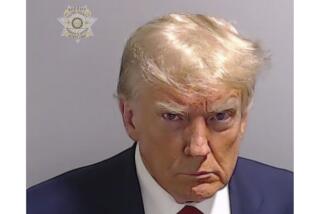Ex-Gov. Tucker Pleads Guilty, Will Aid Inquiry
- Share via
WASHINGTON — Former Arkansas Gov. Jim Guy Tucker pleaded guilty to conspiracy charges Friday and agreed to cooperate fully with Whitewater prosecutors in their investigation of President Clinton’s business affairs in Arkansas.
Whether the development spells additional legal trouble for the president and First Lady Hillary Rodham Clinton was unclear Friday. Although Tucker’s lawyers always have said that the onetime Clinton intimate and rival has no damaging information, the fact that independent counsel Kenneth W. Starr agreed to allow him to avoid prison time appeared to signal Starr’s belief that Tucker could help investigators substantially.
At the very least, Tucker’s plea agreement delivers to prosecutors in the wide-ranging Whitewater inquiry--which began as an investigation of Clinton’s connections to a failed Arkansas savings and loan--the full cooperation of another key witness.
“We do believe this will be a significant advancement toward the goals of this investigation,” said deputy independent counsel Hickman Ewing Jr., who runs Starr’s Arkansas-related inquiry. Ewing declined to elaborate.
Tucker, an inside player in the often-intertwined worlds of Arkansas politics and business, was noncommittal Friday on what he knows.
“I guess everyone would have their own interpretation of that [his possible help to prosecutors],” Tucker told reporters in Little Rock. “What may be important to some people may not be important to others.”
Tucker, 54, was convicted of fraud and conspiracy two years ago along with James B. McDougal and his ex-wife, Susan McDougal, the Clintons’ former business partners in the Whitewater real estate promotion. His guilty plea Friday came on the eve of a second criminal trial--this one on charges that he set up a sham bankruptcy that saved his business group $3 million in federal income taxes after the sale of the group’s cable television system.
Prosecutors want to question Tucker about whether Clinton was truthful when he gave videotaped testimony at Tucker’s 1996 trial denying that he had any involvement with an illegal $300,000 loan to Susan McDougal.
*
The loan first caught the attention of investigators because some of the money passed through the account of an Ozark land venture known as Whitewater. The venture was owned by the McDougals and the Clintons.
The loan was arranged by former Little Rock Municipal Judge David Hale, who owned a federally subsidized management company and has been Clinton’s sole accuser in the matter.
Hale has said that Clinton attended a key meeting at which final agreement was reached on the loan.
Knowledgeable sources said that Tucker also will be asked for possible new information about a controversial land purchase known as the Castle Grande development for which Mrs. Clinton performed some legal work in the 1980s.
Although a six-year statute of limitations on any fraud related to Castle Grande expired long ago, the first lady in recent years has given sworn testimony to investigators about the deal. Tucker might be able to furnish new evidence about Castle Grande that could contradict her testimony, a legal source said.
Some transactions in which “straw parties” purchased land for the Castle Grande project were termed “a sham” by federal bank examiners two years ago. The Clintons have denied any knowledge of wrongdoing in connection with the project, which was directed by the McDougals when they owned the now-defunct Madison Guaranty Savings & Loan.
Mrs. Clinton’s long-missing legal billing records, which surfaced in the White House living quarters in January 1996--two years after they had been subpoenaed--also relate to Castle Grande. Tucker, a private attorney at the time, was part owner of a company that purchased a water and sewer utility at the 1,050-acre Castle Grande site.
*
Although James McDougal has turned against Clinton in the last 18 months after receiving a lenient prison term, his credibility has been subject to attack because he formerly exonerated the president and has acknowledged severe physical and mental problems.
For that reason, any corroboration Tucker could add to information furnished by McDougal would be invaluable to prosecutors, one legal source said. Susan McDougal, by contrast, has refused to cooperate with Starr and is serving a long prison term for contempt.
As part of his plea bargain, Tucker, who has been seriously ill, is to receive probation instead of the maximum five-year prison term that a judge could impose. No date for formal sentencing was set by U.S. District Judge Stephen M. Reasoner in Little Rock.
Tucker, who received a liver transplant in late 1996, moved up from lieutenant governor to become chief executive when his former rival moved to the White House in January 1993. Tucker resigned as governor after he was convicted with the McDougals in 1996.
Clinton and Tucker were political rivals through most of the 1980s, but their only head-to-head race was in the 1982 Democratic gubernatorial primary. Clinton defeated Tucker and three other candidates.
Although he benefited by succeeding Clinton as governor, Tucker has told friends that he never would have been convicted of business crimes were it not for Clinton’s election as president and the resulting Whitewater investigation directed by Starr.
Clinton has acknowledged in videotaped testimony played at the 1996 trial that animosity between the two men runs deep.
More to Read
Sign up for Essential California
The most important California stories and recommendations in your inbox every morning.
You may occasionally receive promotional content from the Los Angeles Times.













